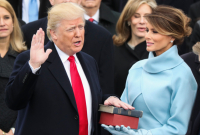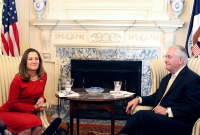Support strong Canadian climate journalism for 2025
In a possible preview of upcoming NAFTA negotiations, Donald Trump's pick as trade czar was urged to get tough with Canada on multiple fronts including lumber, dairy, and intellectual property, during a hearing in the U.S. Congress on Tuesday.
Robert Lighthizer, the nominated trade representative, was having his long-awaited confirmation hearing in the U.S. Senate and a number of the first lawmakers to question him offered pointed queries demanding action regarding the northern neighbour.
The exchanges were notable as a public conversation between actors involved in renegotiating the North American Free Trade Agreement: U.S. law says the U.S. trade representative must consult the Senate finance committee before, during, and after trade negotiations.
They were all there Tuesday.
The Republican chair of the committee, Orrin Hatch, got it started by urging the trade nominee to get more aggressive in screening cargo from Canada for counterfeit or pirated products.
He was followed by the committee's top Democrat, Ron Wyden, who urged a similarly tough approach on softwood lumber. Wyden saying he was disappointed President Donald Trump didn't raise it in his meeting with Prime Minister Justin Trudeau — and regretted that Trump spoke only of minor tweaks to NAFTA.
Lighthizer replied that there are several trade issues involving Canada.
''I've had a variety of issues with respect to Canada that have been raised by senators. . . . Certainly (softwood) is at the top of the list,'' said Lighthizer, who is vying to become the United States trade representative.
''I think there are a number of things we have to address with respect to Canada.''
Tuesday's exchanges involved the lawmakers responsible for consulting U.S. negotiators, ensuring that negotiators get a deal that has the necessary support to win a later ratification vote in Congress.
U.S. trade deals begin and end with Congress.
The U.S. trade representative would need to start consulting lawmakers at least 90 days before negotiations begin, meaning that if the White House launched the NAFTA process this month, it would conduct consultations through the spring, before negotiations started in the summer or fall.
During the same hearing, a Pennsylvania Republican complained about Canadian dairy. Pat Toomey bemoaned Canada's restrictions that severely limit the amount of cheese and milk that can be imported without tariffs.
But many Canadians listening in might have been heartened by something else Toomey said: He blasted the idea of a border-adjustment tax being considered by some Republicans, which would serve as a quasi-tariff on imports.
Toomey said it would invite retaliation, increase prices and limit choices for consumers: ''I think that would be a mistake.''
Another committee member, Republican Pat Roberts, urged the administration to steer clear of reimposing country-of-origin labels on meat, an issue which almost started a trade war and caused international court fights. Roberts led the fight to dump mandatory labelling in 2015.
Lighthizer was asked general questions about NAFTA and he offered general answers.
Asked whether Trump wants NAFTA to remain a three-country agreement or split into multiple bilateral deals, he replied: ''The administration has not made a decision.'' He was also non-committal on what positions he would take with respect to dairy and lumber.
But Lighthizer was adamant that he supports Trump's more nationalist approach. The former Reagan administration official and steel-industry lawyer has frequently expressed frustration with modern trade deals, and derided the idea of completely open trade.
''I agree with President Trump that we should have an America First trade policy.''
Lighthizer used to work on that same Senate committee as a young staffer several decades ago. He was introduced by his former boss, ex-presidential candidate and onetime Senate finance chair Bob Dole.
The 93-year-old Dole credited his former protege's integrity and toughness.
''If you need someone who's aggressive and who's a bulldog, he's seated on my right. Bob Lighthizer,'' Dole said.







Comments
Oh boy! I am sure Canada and other countries just can't wait to do deals with a country that tells its trade partners, "We are sending our best bull dog, and telling him to be as aggressive as possible, making sure America wins and everybody else loses." As a business person, I cannot imagine a more effective way to kill a negotiation before it even gets started.